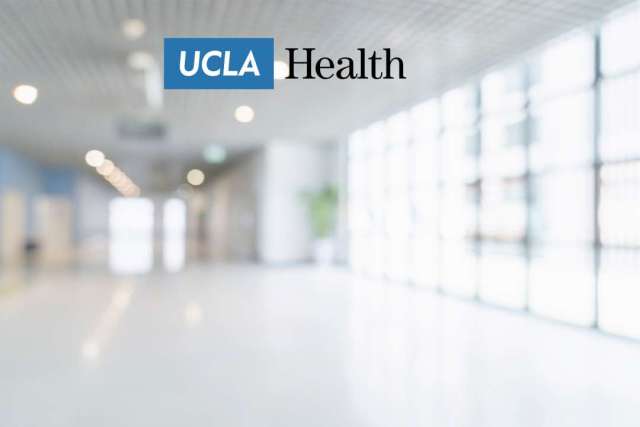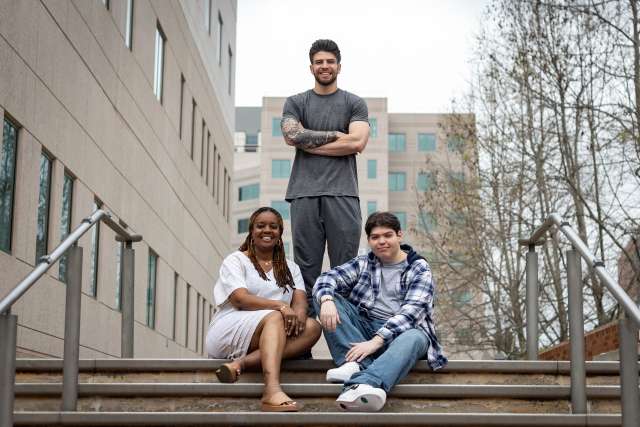In a major step into a new transplantation frontier, UCLA has established a first-of-its-kind program to restore functionality and enhance quality of life for people who have suffered severe trauma or other disfiguring injuries to the upper extremities, face or abdomen.
The UCLA Section of Reconstructive Transplantation represents a multidisciplinary effort to use a new transplantation approach known as vascularized composite allotransplantation to treat patients whose tissue loss cannot be remedied through conventional techniques.
While lifesaving solid-organ transplants have become increasingly common at major centers such as UCLA, reconstructive transplantation — a complex surgery involving composite tissues (bones, tendons, arteries, nerves) — marks a new direction for the field. Unlike organ transplants, which are performed to save lives, reconstructive transplants aim to dramatically improve them.
"Reconstructive transplantation is where we were with solid-organ transplantation in the mid-1980s," said Dr. Ronald W. Busuttil, professor and executive chair of the department of surgery at the David Geffen School of Medicine at UCLA, who established UCLA's liver transplant program in 1984, the first on the West Coast. "With the experience that has been accrued in several centers throughout the world with reconstructive transplantation, it is clear that for certain patients, the outcomes can be life-changing and that major transplant centers such as UCLA should be pursuing this approach."
In making the announcement, Busuttil appointed Dr. Kodi Azari chief of the reconstructive transplantation section, which is part of the UCLA Division of Liver and Pancreas Transplantation. Azari is a pioneer in the field, having led the UCLA surgical team that performed the West Coast's first reconstructive hand transplant in March and having served as one of the lead surgeons on four previous hand transplants in his collaborations with the University of Pittsburgh.
"UCLA has been a leader in transplantation for the past quarter-century, and this is a natural extension of that leadership," Azari said. "We are excited to be able to offer a program of reconstructive transplantation for patients, as well as research to further advance the field."
One of the key tenets of plastic surgery is to use similar tissues from other parts of the patient's body in reconstruction. But for parts of the body such as hands and the nose and mouth area of the face, Azari said, there is no similar tissue — in many cases making conventional reconstruction impossible. Through advanced microsurgical techniques, Azari and his colleagues use composite tissues to construct what the body doesn't readily provide.
The UCLA Section of Reconstructive Transplantation will take advantage of the vast transplantation infrastructure in place at UCLA, which boasts the world's largest solid-organ transplant program. The reconstructive transplants will focus on three parts of the body:
Upper extremity transplantation
"Many patients who have lost one or both hands find that prosthetic devices are not enough to help them get back the life they had enjoyed previously, because they lack the sense of touch of a human hand," Azari said. "In these cases, hand transplantation can offer a unique opportunity to regain dynamic function and the feel of a real human hand."Face transplantation
Patients who have experienced trauma to the face or have lost facial tissue through cancer or another disease may be eligible for a reconstructive transplant if their deformity is not amenable to conventional plastic surgery approaches. Although the procedure has cosmetic value, it can also have important functional purposes. For example, individuals lacking the oral sphincter — the circular area around the mouth that enables the lips to pucker — can have difficulty eating solid foods, drinking and talking.Abdominal wall transplantation
Patients who have experienced injuries to the abdomen, including some who have had multiple surgeries, may lack sufficient tissues necessary for appropriate abdominal closure, resulting in unreconstructable hernias. This can affect everything from their ability to walk to their level of nourishment.
In addition to the clinical program, a robust research effort is being initiated under the direction of Dr. Jerzy Kupiec-Weglinski, professor of surgery, pathology and laboratory medicine and director of the Dumont–UCLA Transplant Research Laboratories. The research will focus on ways to bolster the immune system's ability to tolerate the composite tissue transfer in an effort to reduce the need for immunosuppressive medications.
The David Geffen School of Medicine at UCLA ranks among the nation's elite medical schools, producing doctors and researchers whose contributions have led to major breakthroughs in health care. With more than 2,000 full-time faculty members, nearly 1,300 residents, more than 750 medical students and almost 400 Ph.D. candidates, the medical school is ranked seventh in the country in research funding from the National Institutes of Health and third in the United States in research dollars from all sources.
UCLA Health, which comprises the UCLA Hospital System and the UCLA Medical Group and its affiliates, has provided the best in health care and the most advanced treatment options to the people of Los Angeles and the world for more than half a century. UCLA's preeminence in health care — a strength that comes from the union of research, teaching and excellence in patient care — continues to be recognized nationally, internationally and in numerous forums. The clinical programs of Ronald Reagan UCLA Health - Santa Monica Medical Center–UCLA Medical Center and Orthopaedic Hospital, the Resnick Neuropsychiatric Hospital at UCLA, and UCLA Mattel Children's Hospital have produced a system of hospital care that is unparalleled in California. Ronald Reagan UCLA Medical Center is consistently ranked one of the top five hospitals in the nation and the best in the western United States by U.S. News & World Report, and the UCLA Medical Group has been ranked among the best in Southern California for four successive years by the Integrated Healthcare Association. UCLA physicians and hospitals will continue to be world leaders in the full range of care, from maintaining the health of families to the diagnosis and treatment of complex illnesses.
Media Contact:Roxanne Moster
(310) 794-2264
[email protected]



